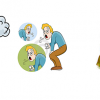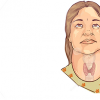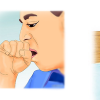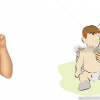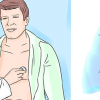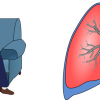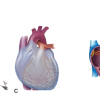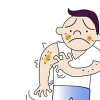Tag: cardiology , difficulty breathing , heart , pulmonary , respiratory tract , shortness of breath
-
Hypertension
High blood pressure is a very common condition when left untreated for a long period leads to many serious diseases like heart disease, kidney disease, peripheral vascular disease and stroke. Hence high blood pressure is also called a "silent killer". Blood pressure is the force of blood pushing against th
-
Rheumatic Fever
Rheumatic fever is a systemic illness which can occur after a throat infection with a bacteria called Streptococcus pyogenes. It’s serious illness that can cause permanent damage to the heart. Rheumatic fever is common in underdeveloped countries like Nepal. It is most common in children (5 to 15 years old) but can o
-
Lung Cancer
Lung cancer (Bronchogenic carcinoma) is the most common type of cancer worldwide and a leading cause of cancer death for both men and women. Lung cancer occurs when the normal cells of lungs abnormally change their characteristics and grow uncontrollably. Lung cancers may be
-
Shortness of breath (Dyspnea)
Shortness of breath or dyspnea is an abnormal awareness of own breathing. It is described differently by different people. Some describe it as not getting enough air or feeling suffocated while others describe it as a sensation of chest tightness or inability to breath out completely. Dy
-
Neck Swelling
Any abnormal enlargement of structures between chin and clavicle bones can cause a neck swelling. Neck swelling usually occurs as a result of disease of lymph nodes in the neck or thyroid gland. Sometimes salivary glands and diseases of muscle and skin around neck may produce a swelling. A neck swelling from enlarg
-
Chest Pain or Tightness
Chest pain is the pain that may be felt anywhere from the level of shoulder to the bottom of ribs. Chest pain or tightness is sometimes a serious symptom, resulting from heart attack. But having chest pain does not necessarily mean you are having a heart attack. Most people who go to the emergency room with chest pain
-
Palpitation
Palpitation is a condition where you become abnormally aware of your own heartbeat. You may feel a sensation of skipped heartbeat, rapid and irregular heartbeat, a forceful thumping or fluttering sensation in your chest. Palpitation,
-
Cough
Cough is our body’s protective response to the presence of irritants in the airway. It is a reflex action caused by the stimulation of the nerve endings in the respiratory tract by stimuli such as allergen, microbes, foreign body or excessive mucous. After the stimuli reaches the bra
-
Pneumonia
Pneumonia is an infection of the lungs caused by a variety of germs. These germs reach the air sacs (lowest part of airways) after inhalation, overcoming body's normal defense mechanism like nasal hairs, mucus and cough which are weakened by smoking or dust inhalation. Once in the lungs,
-
Tuberculosis
Tuberculosis (TB) is a communicable disease caused by Mycobacterium tuberculosis. It can affect any organ in the body but lungs (Pulmonary TB) are the most common site of infection. Other common sites of infection are bones, lymph nodes, kidneys, uterus, brain (meninges), skin, etc. Tuberculosis i
-
Heart Failure
Heart failure means your heart is not able to pump out sufficient amount of blood into the rest of the body. It does not mean that your heart has stopped to beat which is called “cardiac arrest” (see Heart Attack for more informat
-
Heart Attack
Heart attack is a leading cause of death in adults. The medical term for heart attack is myocardial infarction. Heart attack occurs when the blood flow to the heart is severely reduced or completely blocked. The heart muscle needs regular supply of blood and oxygen to survive.
-
Chronic Obstructive Pulmonary Disease (COPD)
COPD is a chronic condition of the lungs that causes difficulty in breathing. It is caused by long standing exposure to irritant gas or particles most commonly by cigarette smoking. In developing countries indoor smoke exposure from firewood burning also is an important risk factor.
-
Asthma
Asthma is a chronic respiratory disease that affects your airways (windpipe). The windpipe is inflamed, narrowed and swollen that causes difficulty in breathing now and then. A person with asthma has no difficulty in breathing most of the time except during an asthma attack. As
-
Diphtheria
Diphtheria is an infectious disease caused by bacteria Corynebacterium diphtheriae. The infection affects the respiratory passage leading to sore throat and breathing difficulties. The disease produces a
-
Atrial Fibrillation (AF)
Atrial Fibrillation (AF) is a disorder of heart rhythm that manifests as an irregular heartbeat. Usually, it is associated with rapid heart rate ranging from 100 to 170 beats per minute. But you can have atrial fibrillation with normal heart rate specially if you are treated with med
-
Allergy
Allergy is a conditions where your body abnormally reacts to foreign substances that normally should not produce any reaction. These substances are called allergens. Your immune system, which is responsible for protection of the body against external agents, recognizes these allergens as “invaders” and produce prot




